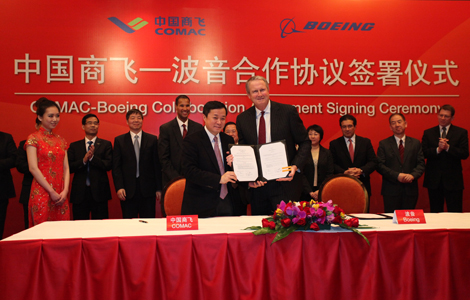The East is Red (or at Least a Kind of Pinkish Color)
China is making inroads in the aerospace business, but it’s difficult to think of an industry that’s harder to break into
So the Chinese are coming, the Chinese are coming, and everywhere we read of how their ambitions in aerospace mean they will inevitably overtake U.S. interests in the industry. Maybe. But it’s a long-shot bet that such an outcome would happen anytime soon, if ever.
Since Deng Xiaoping began the recovery of the nation from its disastrous plunge during Mao’s Cultural Revolution, aerospace has factored in China’s plans for the future. And why shouldn’t it? The industry is considered the crown jewel of developed nations’ economies — a money machine that produces enormous export revenue, with a relatively high cost of entry that acts as a formidable obstacle to any would-be rival. Any ambitions that China may harbor to become a great power — and there’s little question that they have such plans — mean the nation would have to meet, match or overcome the perceived lead in technology enjoyed by the developed countries.

Partners? Rivals? Boeing and the Commercial Aircraft Corp of China (COMAC) sign a collaboration agreement in March 2012. (Boeing)
To that end, McDonnell Douglas dispatched executive Gareth C. C. Chang in the late 1970s to sell aircraft to China, even if those aircraft would be assembled in China to offset some cost. Chang’s father had been a pal of Deng Xiaoping, who blessed the project. But the enterprise foundered after China postponed it, claiming a lack of funds, and although a few MD-80s were produced, the resulting debacle was one of many reasons McDonnell-Douglas was driven into the arms of Boeing (the companies merged in 1997). A Chinese derivative of the MD-90, known as the ARJ21, was launched in 2002 and has yet to be delivered to its first customer.
Notwithstanding that history, China’s latest effort, the Comac C919, is supposed to take on the Airbus A320 and the Boeing 737 if it enters operation as scheduled in 2016. With the single exception of GE Capital, all orders have come from Chinese companies. So there’s no shortage of patience and persistence in Beijing when its comes to aerospace projects. China’s first efforts to become a space-faring power have been reported on other Air & Space blogs for some time now.
More recently, Chinese organizations have gone shopping for distressed U.S. light-airplane manufacturers, and have succeeded in obtaining controlling interests in both Cirrus Design and, more recently, Hawker Beechcraft. More than one U.S. aerospace expert has fantasized about how Walter and Olive Ann Beech, founders of the family-run company from the old days, must be spinning in their graves. Still, as someone in the oil bidness once put it, it makes more sense to buy up existing wells than to drill for your crude. Connect the dots and it appears that China is buying its way into existing airplane manufacturers rather than trying to start up its own industry.
It helps to recall that with the rise and fall of various economies as business cycles play out, the supposed crown jewels of one nation can end up in the hands of another. It happened during the Japanese economic bubble, when that nation’s high-flying investors bought such properties as Rockefeller Center and the golf resort at Pebble Beach. Then Japan’s economy crashed.
What’s most important to keep in mind is that both Boeing and Airbus are steeped in an intense culture that focuses on marketing and customer service as much as on the manufacture of airframes. Both companies can marshal armies of skilled and experienced engineers and technicians to support their products: They hold the customer’s hand when a new product is introduced, and from that tradition comes confidence in their respective products. Russia and the eastern bloc built airliners, too, but sold them mainly to domestic operators because they lacked the service infrastructure that would assure outside customers of satisfaction with the product. It’s difficult to think of an industry that’s harder to break into.
China can surely learn to achieve western-style service and support, but it will take a long time. Communism and socialism were intended to provide equally for all based on the equal efforts of all, but these days China seems to be showing the outside world that family ties come before allegiance to the state or to official ideology. Until the nation can adapt to western business mores, it can’t make the rapid progress it desires.